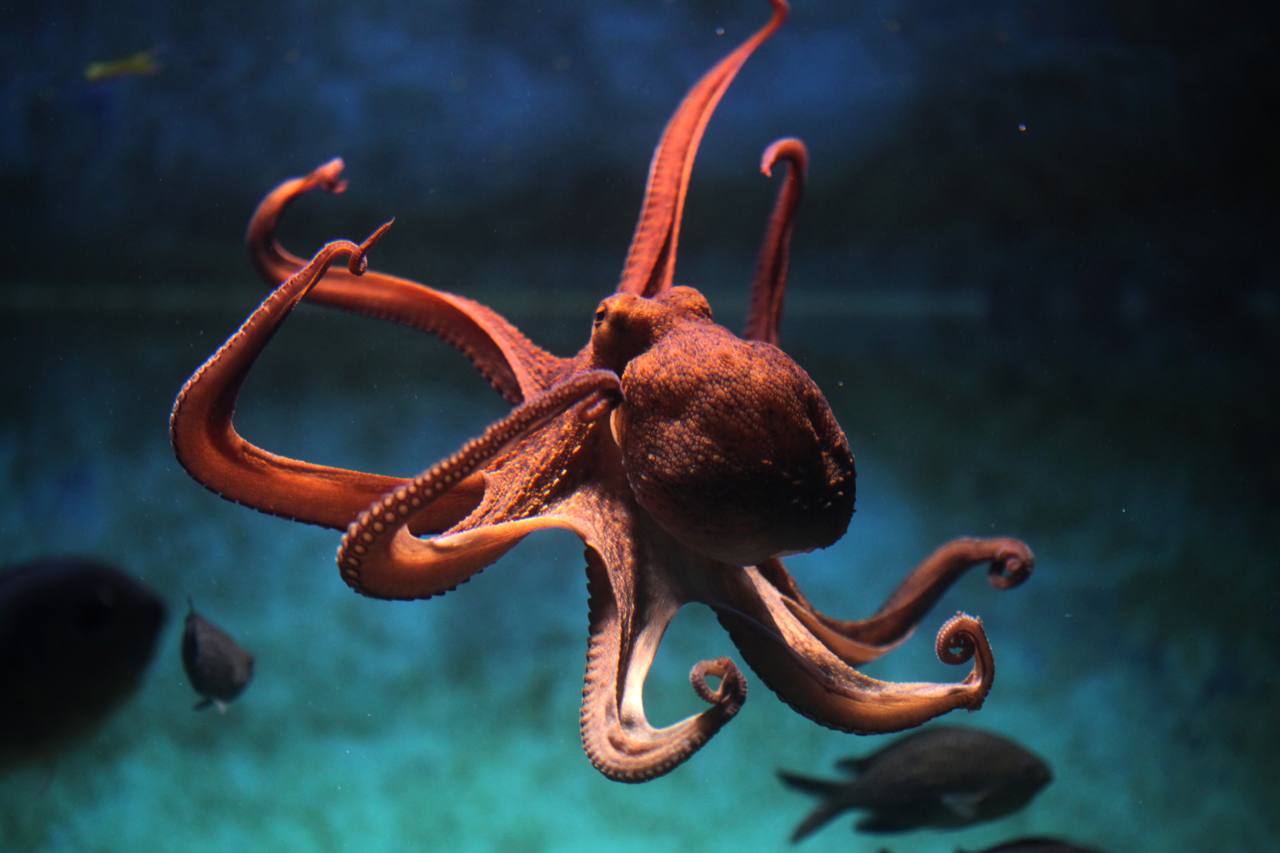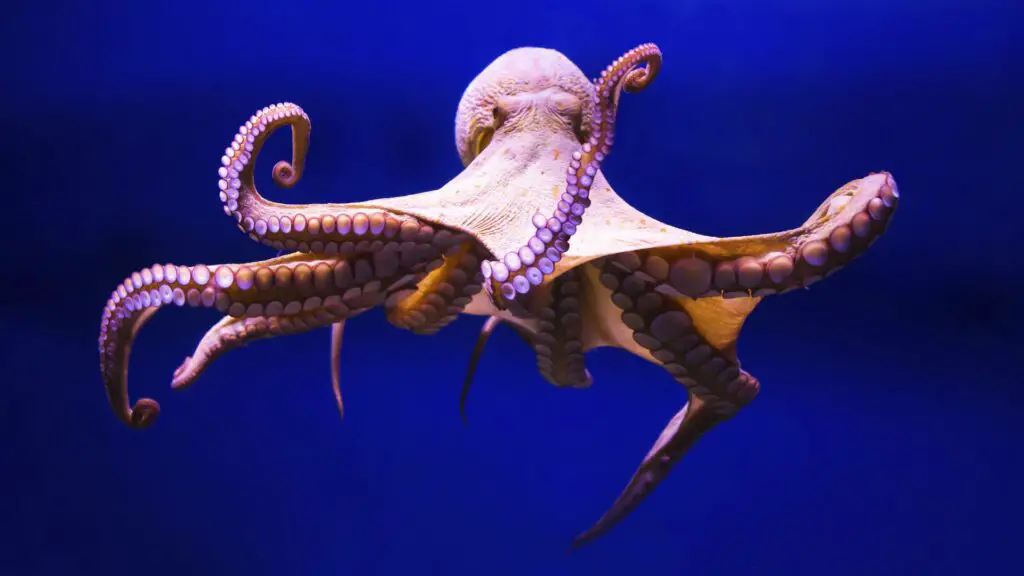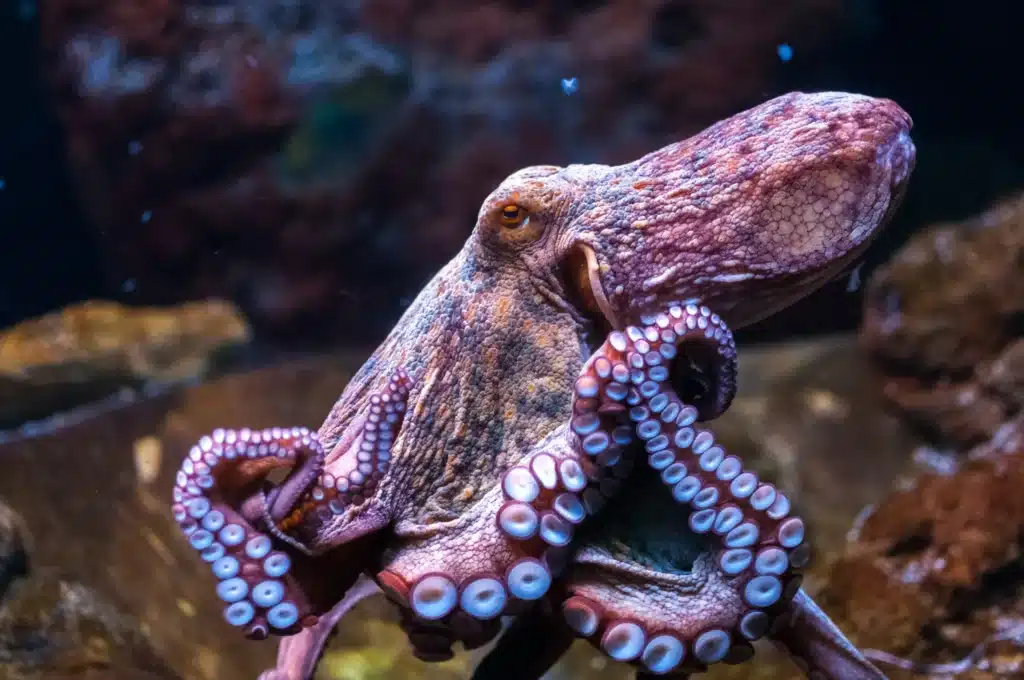Is An Octopus A Fish

Introduction
Is An Octopus A Fish: An octopus is a fish may seem simple on the surface, but it delves into the fascinating world of marine biology, taxonomy, and the complexities of categorizing living organisms. To answer this question, we need to explore the characteristics, evolutionary history, and classification of these two distinct creatures.
Octopuses belong to the class Cephalopoda, a group of mollusks that includes squids and cuttlefish. They are renowned for their remarkable intelligence, highly developed nervous systems, and extraordinary adaptability. Octopuses are boneless, soft-bodied animals known for their distinctive bulbous heads, tentacles, and suction cups.
Fish, on the other hand, are cold-blooded vertebrates that inhabit aquatic environments. They are characterised by gills for breathing, scales covering their bodies, and fins for locomotion. Fish have existed for hundreds of millions of years and have diversified into numerous species, each adapted to specific niches in aquatic ecosystems.
Octopuses and fish are fundamentally different in terms of their evolutionary history, anatomical structures, and genetic makeup. Octopuses are mollusks, whereas fish are vertebrates. While both are incredible examples of marine life, the distinction between them becomes evident upon closer examination.

Is octopus a fish or animal?
Octopuses are fascinating creatures with unique physical characteristics that set them apart from other animals. They are often mistaken for fish, but in reality, they are mollusks, which means they are more closely related to snails and clams than to fish.
An octopus is indeed an animal, but it is not a fish. Both octopuses and fish are part of the animal kingdom, but they belong to different branches of the animal tree of life.
Octopuses fall into the phylum Mollusca and are part of the class Cephalopoda, making them close relatives of squids and cuttlefish. These marine creatures are known for their soft, boneless bodies, numerous arms (usually eight), and an advanced nervous system. Octopuses are highly intelligent, demonstrating problem-solving abilities and complex behaviors.
Fish, on the other hand, are vertebrate animals that belong to various classes within the subphylum Vertebrata. They are characterized by having gills for respiration, scales covering their bodies, and fins for movement. Fish encompass an incredibly diverse group of aquatic animals, ranging from tiny minnows to massive sharks, and they have been around for millions of years.
So, while both octopuses and fish are animals, they are distinctly different in terms of their biological classification and characteristics. Octopuses are mollusks, and fish are vertebrates. Understanding these distinctions helps us appreciate the fascinating diversity of life on Earth and the various ways in which animals have adapted to their respective environments.
Why is an octopus not a fish?
To put it in simpler terms, this why an octopus has no bones — no skeleton — it is an invertebrate. A fish has a backbone and a skeleton — it is a vertebrate. When you look at it that way, you can see why both have two eyes, the ability to extract oxygen from water, etc.
An octopus is not a fish due to several key biological and evolutionary differences that distinguish these two marine creatures.
Taxonomy: Octopuses belong to the class Cephalopoda within the phylum Mollusca. They are mollusks, making them closer relatives of squids and cuttlefish. In contrast, fish belong to various classes within the subphylum Vertebrata, making them vertebrate animals.
Body Structure: Octopuses have soft, boneless bodies and are typically characterized by eight flexible arms lined with suction cups. Fish, on the other hand, have a body structure with scales covering their skin, gills for respiration, and fins for swimming. This fundamental difference in body composition is a significant factor in their classification.
Evolutionary History: Octopuses and fish have vastly different evolutionary histories. Fish have existed for hundreds of millions of years and belong to a lineage of vertebrates, whereas octopuses evolved from a distinct mollusk lineage. These separate evolutionary paths have led to differences in anatomy, behavior, and physiology.
Respiration: Octopuses breathe using gills, similar to fish. However, their gills are enclosed in a cavity and lack the bony gill covers seen in most fish. This anatomical distinction is one of many that sets octopuses apart from fish.
While both octopuses and fish are aquatic animals and share the characteristic of breathing through gills, their differences in taxonomy, body structure, evolutionary history, and other biological features make it clear that octopuses are not fish. Understanding these distinctions is essential in the field of biology and helps us appreciate the rich diversity of life on Earth.
What is an octopus classified as?
The octopus is a marine mollusk and a member of the class Cephalopoda, more commonly called cephalopods. Cephalopoda means “head foot” in Greek, and in this class of organisms, the head and feet are merged.
An octopus is not a fish due to several key biological and evolutionary differences that distinguish these two marine creatures.
Taxonomy: Octopuses belong to the class Cephalopoda within the phylum Mollusca. They are mollusks, making them closer relatives of squids and cuttlefish. In contrast, fish belong to various classes within the subphylum Vertebrata, making them vertebrate animals.
Body Structure: Octopuses have soft, boneless bodies and are typically characterized by eight flexible arms lined with suction cups. Fish, on the other hand, have a body structure with scales covering their skin, gills for respiration, and fins for swimming. This fundamental difference in body composition is a significant factor in their classification.
Evolutionary History: Octopuses and fish have vastly different evolutionary histories. Fish have existed for hundreds of millions of years and belong to a lineage of vertebrates, whereas octopuses evolved from a distinct mollusk lineage. These separate evolutionary paths have led to differences in anatomy, behavior, and physiology.
Respiration: Octopuses breathe using gills, similar to fish. However, their gills are enclosed in a cavity and lack the bony gill covers seen in most fish. This anatomical distinction is one of many that sets octopuses apart from fish.
While both octopuses and fish are aquatic animals and share the characteristic of breathing through gills, their differences in taxonomy, body structure, evolutionary history, and other biological features make it clear that octopuses are not fish. Understanding these distinctions is essential in the field of biology and helps us appreciate the rich diversity of life on Earth.
Is octopus a fish or seafood?
Types of shellfish
Mollusks include squid, octopus, mussels, snails, clams, oysters, abalone and scallops.
An octopus is not a fish, but it is considered seafood when used in culinary contexts. This distinction is essential to understand both from a biological and culinary perspective.
Biologically, an octopus is not a fish; it belongs to the class Cephalopoda within the phylum Mollusca. Octopuses are soft-bodied marine animals known for their intelligence, multiple arms, and the ability to change color and texture to blend into their environment. Fish, on the other hand, belong to various classes within the subphylum Vertebrata and are characterized by gills, scales, and fins.
In the culinary world, the term “seafood” encompasses a wide variety of edible marine animals and plants, including fish, crustaceans (like shrimp and crab), mollusks (like clams and oysters), and cephalopods (like octopus and squid). So, when people refer to octopus as seafood, they are categorizing it as an edible marine organism rather than suggesting it is a type of fish.
Octopus is a popular seafood delicacy in many cuisines around the world, appreciated for its unique texture and flavor. It is prepared in various ways, including grilling, boiling, or as an ingredient in dishes like sushi and ceviche. Understanding the distinction between an octopus as an animal and seafood as a culinary category helps clarify its place in both the natural world and our dining experiences.
Why is octopus called Devil Fish?
Sometimes common octopus is called as a Devil Fish due to its appearance. In earlier times this particular appearance was considered to be evil by men on fishing boats.
The term “Devil Fish” is one of several colloquial names sometimes used to refer to the octopus, though it’s not the most common or universally recognized term. There are a few reasons why octopuses have occasionally been called “Devil Fish”:
Appearance: Octopuses can appear quite alien and otherworldly to some people due to their unique appearance. With their bulbous heads, numerous arms covered in suction cups, and ability to change color and texture rapidly, they can look mysterious and even a bit unsettling to some.
Historical Misconceptions: In the past, when people had limited knowledge about these creatures, octopuses were often misunderstood and associated with myths and legends. In some cultures, they were portrayed as sea monsters or creatures of the deep, which contributed to the “Devil Fish” moniker.
Misidentification: In certain regions, octopuses may have been mistaken for other marine animals or associated with dangerous encounters, leading to the use of dramatic names like “Devil Fish” to describe them.
In the scientific community, they are correctly classified as cephalopods within the phylum Mollusca. More commonly, octopuses are referred to simply as “octopuses” or “octopi” (though the latter is less accurate), and they are appreciated for their remarkable intelligence and adaptability in the marine world.
Is A octopus a type of fish or a squid?
In summary, if you see a sea creature with eight sucker-covered arms and a round shape, that’s an octopus. But if it’s got a long, thin, triangular shape and 10 limbs—eight arms and two tentacles—it’s a squid.
An octopus is neither a type of fish nor a squid. Octopuses, squids, and fish are distinct and separate groups within the animal kingdom, each with its own unique characteristics and evolutionary lineage.
Octopuses belong to the class Cephalopoda within the phylum Mollusca. They are soft-bodied marine creatures known for their intelligence, flexible arms, and ability to change color and texture. Octopuses are closely related to squids and cuttlefish, all of which are classified as cephalopods.
Squids are also cephalopods, but they have elongated bodies, a pair of long tentacles, and a more streamlined shape compared to octopuses. Squids are known for their exceptional speed and agility in the water.
Fish, on the other hand, are vertebrate animals belonging to various classes within the subphylum Vertebrata. They are characterized by having gills, scales covering their bodies, and fins for swimming. Fish encompass an incredibly diverse group of aquatic animals, including bony fish like salmon and trout and cartilaginous fish like sharks and rays.
Octopuses and squids are both cephalopods, while fish belong to a different category altogether within the animal kingdom. Understanding these distinctions is crucial for both biological classification and appreciating the diversity of life in our oceans.
How can I tell the difference between an octopus and a fish?
Distinguishing between an octopus and a fish is relatively straightforward once you know what to look for. The most noticeable difference lies in their basic body structures. Fish are vertebrates, which means they have a spine or backbone, while octopuses are invertebrates, lacking any skeletal structure. This distinction is fundamental.
Fish also typically have scales covering their bodies, which may vary in size and pattern depending on the species. They have fins for swimming and gills for breathing underwater. In contrast, octopuses have soft, gelatinous bodies without scales or fins. Instead, they possess a bulbous head and long, flexible tentacles with suckers, which they use for movement and catching prey. Octopuses also breathe through gills, but their gills are located inside their bodies and are not externally visible like those of fish.
Another key difference is their mode of propulsion. Fish use their fins to swim, moving forward by undulating their bodies from side to side. Octopuses, on the other hand, primarily jet-propel themselves by expelling water from a muscular funnel, allowing them to move swiftly and with agility.
The presence of a backbone, scales, fins, and the method of propulsion are all reliable indicators for distinguishing between an octopus and a fish.
Can octopuses swim like fish?
Octopuses and fish have different methods of propulsion and swimming, and while octopuses are proficient swimmers, they do not swim exactly like fish.
Fish are known for their streamlined bodies, fins, and tail fins, which they use to move through the water with great agility. Their fins provide stability, and they use their tails to generate thrust and control their direction. Fish can maintain buoyancy with the help of gas-filled swim bladders or other adaptations.
In contrast, octopuses have soft, gelatinous bodies and do not have fins or a tail. They primarily use jet propulsion for swimming. By rapidly expelling water through a siphon located on their mantles (the bulbous part of their body), octopuses create a force that propels them through the water. They can control the direction of their movement by changing the direction of the siphon. While octopuses are not as fast or agile as fish, they are still capable swimmers and can move gracefully through their aquatic environments.
So, while octopuses and fish both navigate the ocean, they employ different mechanisms for swimming. Fish rely on their specialized fins and tail for propulsion, while octopuses use jet propulsion by expelling water to move. These adaptations suit the unique lifestyles and anatomical characteristics of each group.

Conclusion
We’ve explored the fundamental differences that set these two remarkable creatures apart. Octopuses, belonging to the class Cephalopoda, are incredibly intelligent, soft-bodied mollusks with unique adaptations like tentacles and suction cups.
On the other hand, fish, which encompass a vast array of species, are cold-blooded vertebrates characterized by gills, scales, and fins. The answer to our question is clear: an octopus is not a fish. It occupies a distinct branch on the tree of life, separated from fish by millions of years of evolution. This differentiation is vital in our quest to comprehend the diverse array of life forms on our planet.
However, this exploration doesn’t diminish the wonder of both octopuses and fish. Each has evolved to excel in its respective ecological niche, showcasing the incredible diversity of life in our oceans. Moreover, it emphasizes the importance of taxonomy in understanding the natural world, as it allows scientists and enthusiasts alike to classify, study, and appreciate the uniqueness of every species.
So, while an octopus may not be a fish, both creatures are integral to the rich tapestry of marine life, reminding us of the awe-inspiring complexity and beauty of our oceans and the importance of preserving their delicate ecosystems for future generations to marvel at and study.



